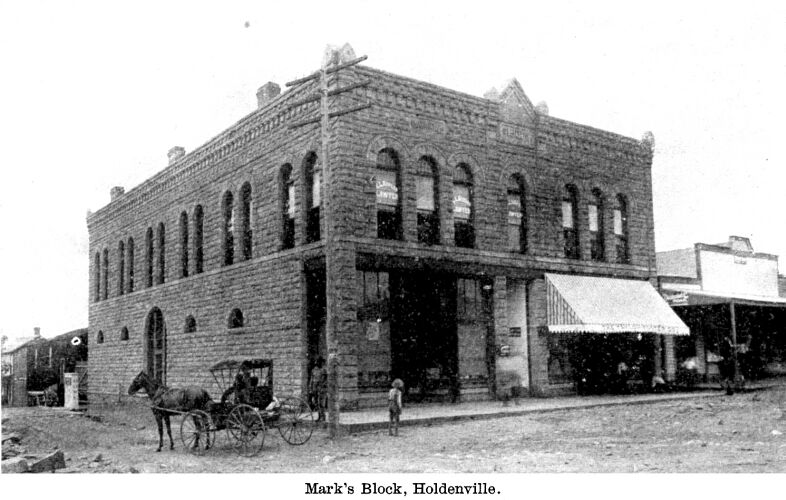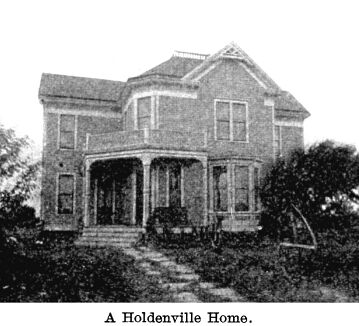|
HOLDENVILLE, INDIAN TERRITORY.
BY J. W. KIEF.
Holdenville is distinctly an American community and one of
the few Territory towns that bears an English name. It was founded
in 1885, and was named for Mr. J. F. Holden, who has taken a keen
interest in every enterprise that would contribute to its growth.
Holdenville is in the southwest corner of the Creek Nation, on
the Frisco System. It has had a slow, steady, substantial growth
from the beginning, despite the anomalous conditions that prevail
in the Territory, and today presents many striking evidences of
a progressive and enterprising citizenship. An authentic census,
just completed, fixes its population at 2,100. It must be remembered
that whatever degree of progress is manifested in the career of
Indian Territory towns, it has been made despite the unsettled
conditions through which they have struggled. Notwithstanding
these hindrances, Holdenville has reached its present status and
is just emerging from the shadows of uncertainty into the dawn
of a new era. The appraisements have been made, titles fixed and
deeds to real estate are being issued. The Creek Council has ratified
the supplemental treaty, and deeds to Indian lands are being issued
to allottees, thus insuring, settled conditions and the passing
of the lands into the hands of white men with the means and disposition
to develop one of the richest and most productive sections of
the Southwest.

Holdenville is ready for the new order of things. The town
has made gigantic strides through the period of discouragement
and takes high rank among the thrifty municipalities of the future
great state to be. It is the commercial center of a rich, agricultural
section, with no trade rival within a radius of 50 miles. From
the natural elevation on which it stands one gets a charming view
of the surrounding country. In the distance are heavily wooded
hills and well-filled streams, while intervening are rolling plains
which richly produce all the cereals and cotton; rich pasture
lands on which thousands of cattle are fattening; upwards of five
thousand bales of cotton have been ginned and marketed this year;
thousands of hogs and cattle shipped to distant markets; corn,
wheat, oats and potatoes yield in abundance, while vigorous young
orchards and small fruits give evidence of climatic conditions
well adapted to their healthy growth and development. These are
the sources from which Holdenville draws its substance and prosperity.
 The town is growing
rapidly. The business section is hedged in by numerous fine blocks
of native stone and brick buildings, which do credit to the energy,
push and enterprise of its citizens. The imposing array of handsome
residences is an index to the refinement and intelligence of the
people. Three solid banks are the pride of the commercial interests
and the annual volume of business done by the merchants is ample
tribute to their business enterprise. As a wholesale center Holdenville
possesses superior advantages. Situated at the crossing of the
Frisco System and Choctaw railroad, it has in and out-shipping
facilities that have made it a jobbing point of considerable consequence.
Already there are three wholesale grocery houses, two flour and
feed firms, an ice plant, three packing companies have branch
houses here from which they distribute $60,000 worth of their
products annually. The town is well supplied with churches and
fraternal organizations. Bonds have been voted to build a $10,000
school house. More than 500 children attended the city schools
this year, and $4,000 will be expended for school maintenance
next year. The town is growing
rapidly. The business section is hedged in by numerous fine blocks
of native stone and brick buildings, which do credit to the energy,
push and enterprise of its citizens. The imposing array of handsome
residences is an index to the refinement and intelligence of the
people. Three solid banks are the pride of the commercial interests
and the annual volume of business done by the merchants is ample
tribute to their business enterprise. As a wholesale center Holdenville
possesses superior advantages. Situated at the crossing of the
Frisco System and Choctaw railroad, it has in and out-shipping
facilities that have made it a jobbing point of considerable consequence.
Already there are three wholesale grocery houses, two flour and
feed firms, an ice plant, three packing companies have branch
houses here from which they distribute $60,000 worth of their
products annually. The town is well supplied with churches and
fraternal organizations. Bonds have been voted to build a $10,000
school house. More than 500 children attended the city schools
this year, and $4,000 will be expended for school maintenance
next year.
A successful telephone system is in operation and an electric
light plant is among the near future probabilities. Among the
other productive enterprises are three gins, a saw mill, a feed
and chop mill, a 20-ton ice plant, a stone quarry and brick yard.
Holdenville has pursued a waiting policy, but all these years
has been gathering latent energy which, when the thralldom of
retarded development is lifted, will enable it to advance to the
front rank of Territory towns.
Frisco System | Stories Page
| Contents Page
|







